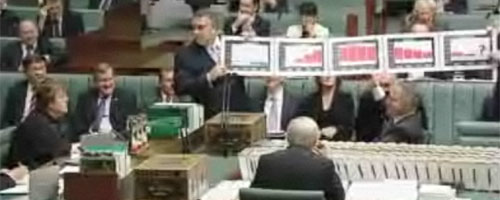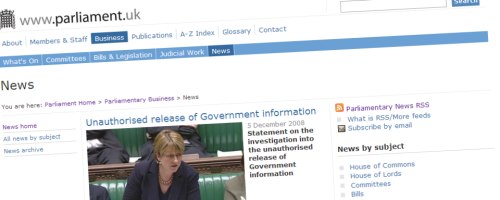The Commons Public Administration Select Committee has published its report into government IT, and to be frank, it’s all a bit predictable. That doesn’t mean it shouldn’t be welcomed: the four highlighted points – better management information, greater transparency, more involvement of SMEs, agile working – are all good. But if we haven’t heard it all before, we probably should have done.
The report’s opening factoid – that ‘some departments spend an average of £3,500 on a desktop PC’ – will almost certainly grab the headlines. (Update: step forward Sky News, who do a textbook job of it, including under-informed talking head.) It shouldn’t – but the report doesn’t help itself by putting this figure in the second paragraph of its introduction, without any context (as Paul Clarke has already noted).
The real story, such as it is, is the Committee’s apparent recognition that the current process – reliant on a small number of large suppliers being given over-spec’ed, over-detailed, over-sized and over-priced projects – is the ‘root cause‘ of the problem. And it’s quite nice to see them challenging the Cabinet Office, about whether its initiatives are tackling that root cause, or just the symptoms (paras 10-11).
Para 13 goes on to list what the Committee sees as the ‘six underlying causes of failure in government IT’:
- Inadequate information, resulting in the Government being unable to manage its IT needs successfully;
- An over-reliance on a small number of large suppliers and the virtual exclusion of small and medium sized (SME) IT contractors, which tend to be less risk adverse and more innovative;
- A failure to integrate IT into the wider policy and business change programmes;
- A tendency to commission large, complex projects which struggle to adapt to changing circumstances;
- Over-specifying security requirements, and
- The lack of sufficient leadership and skills to manage IT within the Civil Service, and in particular the absence of an “intelligent customer” function in Departments.
It acknowledges that outsourcing has often gone too far, leaving Departments short of people able to manage suppliers – the ‘recipe for rip-offs’ which gives the report its inflammatory title:
Currently the Government seems unable to strike the right balance between allowing contractors enough freedom to operate and ensuring there are appropriate controls and monitoring in-house. The Government needs to develop the skills necessary to fill this gap. This should involve recruiting more IT professionals with experience of the SME sector to help deliver the objective of greater SME involvement.
I’m not sure about the need to hire too many new people: Whitehall already has a decent number of insightful specialists, dotted around various Departments, and it would certainly be a start to concentrate their skills and experience within the evolving Government Digital Service (as outlined in the engagement-centric contribution I made to Alphagov, along with Neil and Steph). Speaking for myself, I wouldn’t apply for any such recruitment exercise: for now at least, I think I can do ‘my bit’ better from outside, rather than inside.
On engagement itself, it’s good to see the report recommending ‘that Departments exploit the internet and other channels to enable users to provide direct online feedback both in the design of services and in their ongoing operation and improvement’ – as that’s broadly what we put in the Alphagov proposal.
Not for the first time, data transparency is presented as a silver bullet to eliminate the profligate spending – except that, as Paul Clarke notes, the report rather undermines itself by ‘intentionally’ (Paul’s word) throwing opaque figures around. Can transparency solve the problems? In theory, I want to agree – but a year into Cameron’s open data revolution, I can’t think of many grand successes.
And there’s surprisingly little about open source per se – although you could argue it’s probably implicit in references to greater SME involvement, supplier lock-in and use of non-proprietary data formats.
So, personally, I’m struggling to get excited by the report. It’s not the first time any of these things have been said: and the government response will contain a lot of ‘we’re doing this already’… which, in fairness, they probably are. If the report helps keep those plans on the straight and narrow, I suppose it’s done its bit. As long as we get there in the end.
 Bad news for anyone who’s just put a massive amount of work into an innovative, cutting-edge website for an MP. (
Bad news for anyone who’s just put a massive amount of work into an innovative, cutting-edge website for an MP. (

